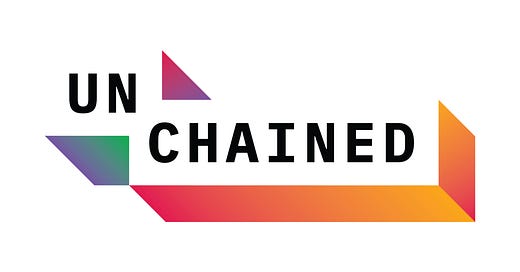Key Elements for Successful Spot Bitcoin ETFs 🥇
Weekly News Recap: 🌐 Orbit Chain's $81.5M heist, 🛣️ Ethereum's 2024 roadmap, ⚖️ Bankman-Fried's trial halted, ✈️ Binance's CZ travel ban, 📝 IRS's new crypto reporting, and more!
You are reading the Unchained Weekly newsletter, where we cover all the major news in the crypto space, providing insights into the market's latest trends, regulatory shifts, and technological advancements. Stay informed. Your no-hype resource.
In this episode of Unchained, Spencer Bogart, general partner at Blockchain Capital, analyzes the latest developments in the run-up to a potential spot Bitcoin ETF approval.
He discusses the role of key players like Goldman Sachs, the impact of a critical report from Matrixport, and the effects of these events on Bitcoin's market dynamics. Bogart highlights the market's reaction to the Matrixport report, noting, "When I see the market react like that, 7% to 'thing that person said on the internet,' that tells me that the market was just a little bit overextended in the short term." He also delves into various factors that will influence which ETFs win market share, including the importance of seed funding, distribution strategies, and brand recognition.
Also, who will be the winner among ETF issuers? Don’t miss it!
Listen to the episode on Apple Podcasts, Spotify, Overcast, Podcast Addict, Pocket Casts, Pandora, Castbox, Google Podcasts, Amazon Music, or on your favorite podcast platform. Or watch it on YouTube.
Weekly News Recap
Orbit Chain Is Exploited for $81.5 Million
On New Year's Eve, Orbit Chain's cross-chain bridge suffered a major hack, leading to the loss of $81.5 million in various cryptocurrencies and stablecoins. The attack involved five separate transactions to different wallets, including $50 million in stablecoins, $10 million in wrapped Bitcoin, and approximately $21.5 million in Ethereum. This hack capped a year that saw crypto users lose nearly $2 billion to similar incidents, although the figure did represent a 50% reduction from the previous year.
Further investigation by Match Systems, a blockchain analysis firm, which was reported by Cointelegraph, suggests that the perpetrators of the Orbit Bridge heist may have been involved in several other 2023 crypto cyberattacks, including those against Coinspaid, Coinex, and Atomic Wallet. Their analysis, identifying patterns akin to those used by the notorious North Korean organization, the Lazarus group, revealed a complex web of transactions. The attackers funded a wallet using Tornado Cash to obscure fund origins and then used the SWFT protocol to transfer funds across chains, eventually cashing out through a Tron wallet possibly linked to the CIS region. These methods mirror techniques seen in other notable hacks, such as those of DFX Finance, Deribit, and AscendEX.

Amid these revelations, the U.S. Federal Bureau of Investigation has recognized the Lazarus group as the culprit behind the 2023 Atomic Wallet and Coinspaid hacks. Orbit Chain, in collaboration with the Korean National Police Agency and KISA, has intensified its investigation, even uncovering a -quote- “significant clue” in the process, though the details remain undisclosed.
In related news, DeFi protocol Radiant Capital suffered a $4.5 million hack exploiting a new market activation vulnerability, prompting them to temporarily suspend lending and borrowing activities on Arbitrum. Moreover, and quite ironically, the founder of Nest, a security-focused crypto wallet app, lost $125,000 in a phishing scam involving a counterfeit token.
Curtains for Second Trial: Sam Bankman-Fried Awaits Sentencing
In a pivotal development, U.S. prosecutors have opted not to pursue a second trial against Sam Bankman-Fried, former CEO of the defunct FTX cryptocurrency exchange. Convicted in November on seven counts of fraud and conspiracy involving the embezzlement of $8 billion from FTX customers, Bankman-Fried's sentencing is scheduled for March 28, 2024. The latest decision, driven by the strong public interest in a swift resolution to the case, acknowledges that most of the evidence relevant to the additional charges—such as campaign finance violations and operating an unlicensed money-transmitting business—was already presented during the first trial. And the Bahamas, crucial to this legal process due to extradition treaties, hasn't yet consented to trying the remaining charges. With this backdrop, the focus shifts to the upcoming sentencing, which will likely address restitution for Bankman-Fried's victims.
Vitalik Buterin Updates 2024 Roadmap for Ethereum
Vitalik Buterin, Ethereum's cofounder, shared an updated roadmap for Ethereum in 2024, maintaining a steady course with only minor adjustments from the previous year. Central to this strategy are six key components: the Merge, Surge, Scourge, Verge, Purge, and Splurge. The Merge, executed in 2022, transitioned Ethereum to a more energy-efficient proof-of-stake system, drastically cutting energy consumption and strengthening blockchain finality.
Buterin's roadmap focuses on scaling transaction capabilities through the Surge, aiming for 100,000 transactions per second. The Scourge and Verge prioritize mitigating economic centralization risks and simplifying block verification, respectively. Meanwhile, the Purge and Splurge concentrate on streamlining the protocol and broader ecosystem improvements.

This updated vision stays true to Ethereum's original goal of a decentralized, privacy-focused network, with an emphasis on peer-to-peer messaging and decentralized file storage. It’s also in line with Vitalik’s recent appeal to the crypto community to go back to the cypherpunk ethos that was so characteristic of the early days of the industry.
Travel Restrictions Continue for Binance's CZ
Changpeng "CZ" Zhao, the founder of Binance, has been denied permission for the second time to travel abroad by a U.S. federal judge. As Zhao awaits sentencing in February for criminal charges in the United States, U.S. District Court Judge Richard Jones upheld the travel ban, citing concerns that Zhao might be a flight risk. This decision aligns with the prosecutors' stance and marks a continued restriction on Zhao's international movements. Judge Jones had previously overturned a ruling allowing Zhao to return to the United Arab Emirates ahead of his sentencing.
The details of Zhao's arguments against these travel restrictions remain undisclosed in the sealed ruling. Zhao, who had previously pleaded guilty to violating the Bank Secrecy Act, is currently out on a $175 million personal recognizance bond, along with other financial conditions.

IRS Enacts New Crypto Reporting Rules for Large Transactions
Effective January 1, 2024, the U.S. Internal Revenue Service (IRS) is requiring crypto investors engaged in “trade or business” to report transactions exceeding $10,000. This directive, part of the 2021 Infrastructure Investment and Jobs Act, aligns digital asset transactions with cash reporting standards, although what constitutes a “trade or business” transaction, as opposed to a “hobby”-related one, is subject to interpretation. In cases where transactions are required to be reported, the IRS demands details including the sender's name, address, and social security number within 15 days of the transaction. This measure aims to decrease the tax gap in the U.S. by monitoring large crypto transactions.

However, practical application challenges arise, as highlighted by Coin Center's Executive Director Jerry Brito. Complexities include reporting sender details in decentralized transactions, and determining the fiat value of cryptocurrencies. This has raised concerns about privacy and legal clarity. Despite a previous legal challenge by Coin Center, the IRS has yet to provide specific guidance, leaving unanswered questions about compliance and reporting methods.
In a related topic, as the year-end tax deadline loomed, there was a notable increase in NFT tax loss harvesting, with services emerging to help traders sell now-worthless NFTs for tax benefits.
USDC Stablecoin Briefly Depegs Amid Market Turbulence
Circle's USDC stablecoin experienced a temporary depegging on Binance, dropping to $0.74 amid a broader market sell-off fueled by uncertainties around the approval of a Bitcoin ETF. The depegging resulted from substantial sell orders surpassing the available liquidity. This instability coincides with the liquidation of derivatives positions worth over $650 million, following a Matrixport report casting doubts on the belief that the SEC will imminently be approving spot Bitcoin ETFs. This incident adds to a history of minor depeggings for USDC, with a notable one occurring last March due to the turmoil around the collapse of Silicon Valley Bank.






